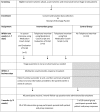Medication coaching program for patients with minor stroke or TIA: a pilot study
- PMID: 22830539
- PMCID: PMC3490769
- DOI: 10.1186/1471-2458-12-549
Medication coaching program for patients with minor stroke or TIA: a pilot study
Abstract
Background: Patients who are hospitalized with a first or recurrent stroke often are discharged with new medications or adjustment to the doses of pre-admission medications, which can be confusing and pose safety issues if misunderstood. The purpose of this pilot study was to assess the feasibility of medication coaching via telephone after discharge in patients with stroke.
Methods: Two-arm pilot study of a medication coaching program with 30 patients (20 intervention, 10 control). Consecutive patients admitted with stroke or TIA with at least 2 medications changed between admission and discharge were included. The medication coach contacted intervention arm patients post-discharge via phone call to discuss risk factors, review medications and triage patients' questions to a stroke nurse and/or pharmacist. Intervention and control participants were contacted at 3 months for outcomes. The main outcomes were feasibility (appropriateness of script, ability to reach participants, and provide requested information) and participant evaluation of medication coaching.
Results: The median lengths of the coaching and follow-up calls with requested answers to these questions were 27 minutes and 12 minutes, respectively, and participant evaluations of the coaching were positive. The intervention participants were more likely to have seen their primary care provider than were control participants by 3 months post discharge.
Conclusions: This medication coaching study executed early after discharge demonstrated feasibility of coaching and educating stroke patients with a trained coach. Results from our small pilot showed a possible trend towards improved appointment-keeping with primary care providers in those who received coaching.
Figures
References
-
- Roger V, Go A, Lloyd-Jones D, Adams R, Berry J, Brown T, Carnethon M, Dai S, De Simone G, Ford E, Fox C, Fullerton H, Gillespie C, Greenlund K, Hailpern S, Heit J, Ho M, Howard V, Kissela B, Kittner S, Lackland D, Lichtman J, Lisabeth L, Makuc D, Marcus G, Marelli A, Matchar D, McDermott M, Meigs J, Moy C, Mozaffarian D, Mussolino M, Nichol G, Paynter N, Rosamund W, Sorlie P, Stafford R, Turan T, Turner M, Wong N, Wylie-Rosett J. Heart Disease and Stroke Statistics, Update: A report from the American Heart Association. Circulation. 2011;2010 doi: 10.1161/CIR.0b01333182009701. - DOI - PubMed
-
- Olson D, Prvu-Bettger J, Alexander K, Kendrick A, Irvine J, Wing L, Coeytaux R, Duncan P, Graffagnino C. Transition of Care for Acute Stroke and Myocardial Infarction Patients: From Hospitalization to Rehabilitation, Recovery, and Secondary Prevention. Evidence Report No. 202. AHRQ Publication No. 11 (12)-E011, Rockville, MD; 2011. - PMC - PubMed
Publication types
MeSH terms
LinkOut - more resources
Full Text Sources
Medical
Miscellaneous



